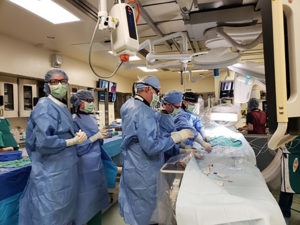
Novel Peptide Treatment May Help to Prevent and Reverse Type 1 Diabetes
Type 1 diabetes is an immune-mediated disorder that causes dysfunction of insulin-producing beta cells in the pancreas, leading to a defect in insulin production. Insulin triggers the transport of glucose and free fatty acids from the blood stream into cells where they are stored or used to produce energy. The dysfunction of pancreatic beta cells prevents this process from occurring, resulting in excess sugar (hyperglycemia) and free fatty acids (dyslipidemia) in the blood, leading to damaged blood vessels and decreased nerve conduction in many parts of the body.
Previous studies conducted in non-obese diabetic mice have demonstrated that the mechanism of autoimmune-induced dysfunction in type 1 diabetes is related to the interaction of two molecules, and the disruption of that interaction may help to prevent or reverse diabetes. To prevent this interaction, researchers have developed a peptide that binds to a portion of one of the immune molecules involved. When mice were treated with the peptide prior to when they would normally develop diabetes, only 10% of treated mice became diabetic; and the treatment also significantly delayed development of diabetes in those 10%. Mice were also treated with the same peptide after they had developed diabetes, and 56% of those diabetic mice returned to a normal level of sugar in the blood after 1-2 days. This study indicates that in this model, diabetes may be prevented or reversed using treatment with this novel peptide.
This study has important translational implications because the molecule to which the peptide binds is 87% identical to the corresponding molecule in humans, indicating that treatment may also be beneficial for people at risk for or with type 1 diabetes. Ongoing research conducted at Colorado State University seeks to elucidate the potential benefits of the treatment in canines, with the hope that it helps to prevent the development of diabetes in dogs. If this is successful, the peptide will likely be tested in humans.
“This is a great example of how a project can move from a rather artificial model (the specific mouse strain) to a non-human species that develops the same or a very similar condition spontaneously (i.e. naturally-occurring, not induced), the dog, and from there, not only translates in to human health, but is still likely to help dogs! A win-win!”
– Dr. Craig Webb
“There is no treatment for type 1 diabetes in humans or in human’s best friend. An advance is highly significant for both!”
– Dr. David Wagner
Key benefits of the findings:
- The use of the novel peptide was successful in preventing and reversing diabetes in mice, and the peptide was not shown to bind to unrelated or unintended molecules, reducing the risk of side-effects
- The treatment developed in mice may be successful in humans due to the similarity of the molecules involved.
Investigators:
Craig B. Webb, PhD, DVM, DACVIM
Tracy L. Webb, PhD, DVM
David H. Wagner, PhD
Gisela M. Vaitaitis, MS
Dan M. Waid
References
Study in mice: https://www.ncbi.nlm.nih.gov/pmc/articles/PMC4183717/





